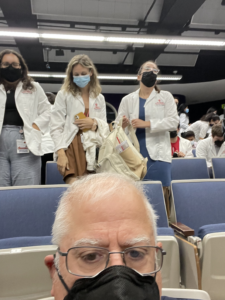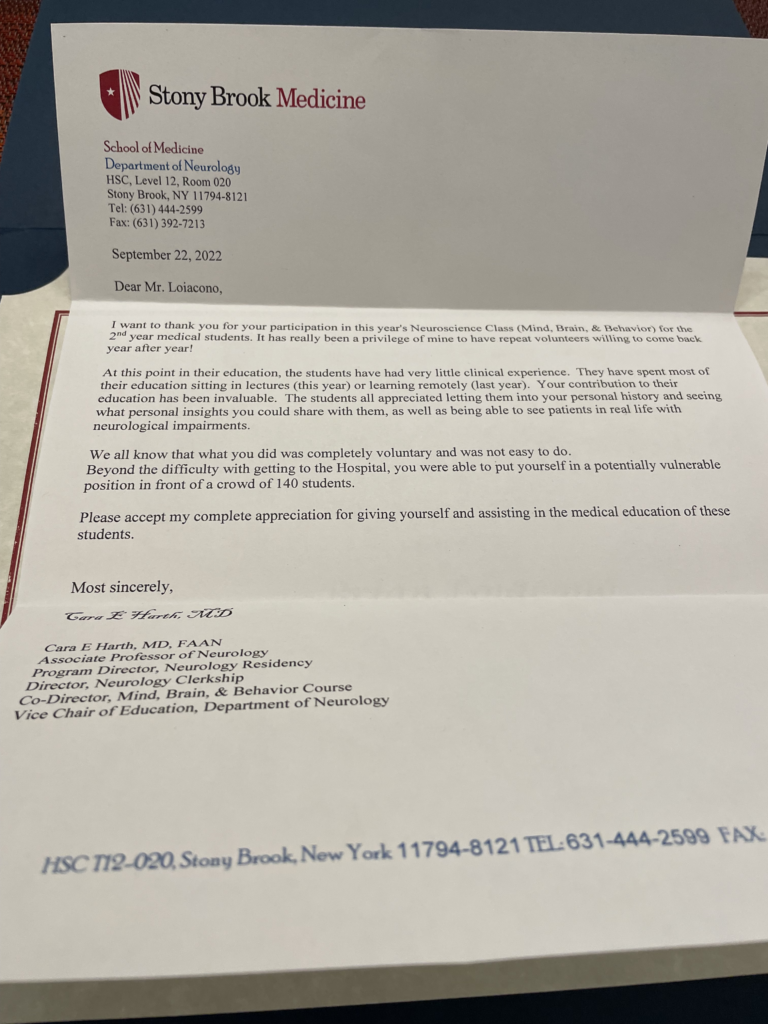If we want to control the narrative, we need to tell our stories
by Brian Jude Loiacono

I was formally diagnosed with FSHD in January 2019. At that time I knew I was in trouble, because I began falling when I was walking. Being a retired compliance auditor it was inherent for me to dig deep for the root cause. I received a diagnosis of FSHD, but when you’re told out of the gate that there is no cure, I felt frustrated, to say the least. My doctor explained in great detail the excellent research and trials that were going on, and said hopefully there was a drug in the pipeline to help thwart the progression of the disease. This made me feel better. I had to play the hand I was dealt.
I attended many web meetings with the FSHD Society, Wellness Hour, and so on, which provided great information and resources. But it wasn’t until I was asked by my neuromuscular doctor, Simona Treidler, if I would speak with medical students, that I realized I could make a difference. Dr. Treidler is at Stony Brook University Medicine, an amazing clinician and most importantly a warm-hearted doctor who advocates for me daily. She was instrumental in helping me walk with the assistance of leg braces. When she asked if I would allow students to examine me and answer their questions, of course I wanted to do my part. As a result, she connected me with Dr. Cara Harth, assistant professor, program director and vice chair of education for Stony Brook University, and off I went.
When I first met with the students, it was in an auditorium. I had to take off my shirt to show my winged scapulas which are very pronounced. The first time I did it, it was a little unsettling because I wasn’t prepared or used to it. But by the second and third years, it had become second nature. The engagement with the students made it all worthwhile, and it became therapeutic. FSHD was new to them, as it had once been for me. I now knew this is what I need to do, to help our future doctors by teaching them.
My late father told me early on in life, “You need to make your own breaks.” That wisdom rings so true today. No “Woe is me” here. I’m taking charge of my own destiny. However, that is easier said than done–trust me on that. Since 2019, my sleep has been a challenge. Bad headaches and neck pains have taken over. My scapulas have paralyzed me from the shoulder blade up. And even though I have leg braces to walk, the challenges don’t go away.
The purpose of this blog is to encourage my FSHD Family to reach out to your doctors and ask if they can help you to teach the future doctors of the world about our challenges. If we want to control the narrative of what FSHD is, and how medical doctors learn about it, we who live with FSHD should be the ones to tell the story.
In closing, in the spirit of the holidays, let’s make it happen. You will feel liberated by helping humankind. In unity there is strength.
God Bless You All,
Brian Jude Loiacono



When a patient is willing to use their diagnosis as a stepping stone for researchers, doctors and budding doctors doors are opened for future patients.
I commend your fathers wisdom and your attitude to how you are walking through this. You are an encouragement to many!
Brian is my best friend and has been since 3rd grade. We have negotiated the highs and lows that life has sent our way. Brian has dealt with his issues with class and a level headed approach. I am proud of him
Brian, that was great. I read it while I was waiting to see the doctor I hope that your sacrifice inspires someone to find a cure.